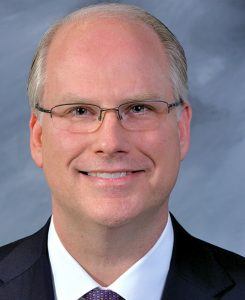McDaniel: Legal challenges to medical marijuana will ensure confidence
by April 10, 2018 4:16 pm 1,690 views

Former Arkansas Attorney General and Jonesboro State Representative Dustin McDaniel has a lifetime of connections to Northeast Arkansas. Now, in private law practice with McDaniel, Richardson, and Calhoun, PLLC, he’s recently pulled together an investor group to explore opportunities in Arkansas’ new medical marijuana industry.
McDaniel’s group, Natural State Wellness Enterprises of Jonesboro, was one of five cultivation center applications chosen by the state’s Medical Marijuana Commission. He and his investors plan to site their marijuana growing facility in the Newport area (Jackson County).
In late March, Pulaski County Judge Wendell Griffen threw a wrench in the state’s fledgling medical marijuana business by declaring the selection process “null and void” after a lawsuit from a runner-up challenged the final picks and selection process. As of this posting, the process remains in limbo.
McDaniel sat down with Talk Business & Politics CEO Roby Brock to discuss what happens next.
Roby Brock: Let’s focus on the positives first. The selection process did bring four out of the five cultivation centers to the Delta, including Northeast Arkansas. Why do think that region was so attractive to cultivators? What do you think the economic potential is for medical marijuana?
Dustin McDaniel: I think that the potential is extraordinary. There will be an early capital investment in the facilities themselves. There will be construction jobs. Then there will be permanent employment, and these are high-tech jobs. They are indoor, hydroponic, industrialized agriculture facilities. This will require specialized training, background checks and an understanding of how to manage every element of the input.
One of the things that I’ve learned about this plant is that for folks who have smoked marijuana unlawfully for years, that plant can be grown in the cracks of somebody’s driveway, but if you’re going to have a lab-certified, medical-grade cannabis, that is far more complicated than roses and orchids put together. These are going to be good jobs in those areas.
Brock: Judge Wendell Griffen declared “null and void” the process for selecting cultivation facilities. I assume that you disagree with that decision. What’s the error in his conclusion?
McDaniel: As you know, my experience is representing the state and handling administrative law matters for a good number of years. We believe that the commission handled themselves appropriately. We believe that they set up rules and followed those rules. Anyone can say, “Here’s how I think we should rewrite the rules.” And that’s fine, but that’s for the legislature and for the appointees and even for the voters. Things that could have been written in the Constitution, weren’t. And so, the rules themselves were constitutional and the rules were followed.

At this point, litigation is to be anticipated in any of these matters. This is happening in every single state in the country where cannabis is a new fledgling industry, but we expect that it will work its way through the courts. Hopefully, sooner rather than later and frankly, I expect the same five that were awarded cultivation licenses to ultimately, be awarded licenses.
Brock: Has this completely put your plans on hold, at this point in time?
McDaniel: No, I wouldn’t say that it has. We have a license. It was actually issued to us. If you look at our motion that we filed, we attached a copy of the license because DF&A has a sense of humor, it’s on green paper. We are advancing with the purchase of our land, and the designs of our facility, and I would anticipate that construction preparation and litigation will happen simultaneously.
Brock: You think that the legal wrangling will conclude pretty rapidly?
McDaniel: No way to know that. I think that certainly, we will all ask for an expedited briefing schedule at the [Arkansas] Supreme Court, but that’s entirely up to the court. I am told of various legal strategies from some of the other groups that are still in various stages of becoming solidified. I certainly, I hope that this is all over and done within a matter of weeks, but it may be longer than that.
Brock: Business aside, what do you say to the people who voted for this, for medical marijuana as a treatment for illness, to relieve their pain, to address their conditions? This looks like they may be delayed in getting that medical relief.
McDaniel: I am extremely sympathetic to someone who’s going through chemotherapy right now and is either doing without medication, is buying that medication illegally or is being compelled to travel to neighboring states to get their medication. I am very sad for the parent of a child who has uncontrollable seizures, knowing that carefully prescribed and administered cannabis oil, and cannabis derivatives, can make a difference in that child’s quality of life.
We talk about children and marijuana now and in an understanding that this is medication. No one is giving a child a marijuana cigarette to smoke. This is about helping kids who are really facing horrible medical conditions. All I can say to those parents and to those patients, is that the democratic process is not perfect, and it is complicated, but you know, as President [Bill] Clinton always said, “More than 50% of the time, more than 50% of the people get it right.” And we will.
We will do everything we can to move as quickly as possible, while still respecting the role of the courts. One thing that I would say both to the general public, and patients, and my own investors is that this is an important step. The people voted. The legislature acted. The executive branch has done its job. And now, the courts have a role to play to ensure that everything that needed to be done correctly has been.
So, when this part is over, people will have great confidence in the system that will emerge — whether you’re an investor, or a patient, or a physician, or a community that’s hoping to create jobs.
